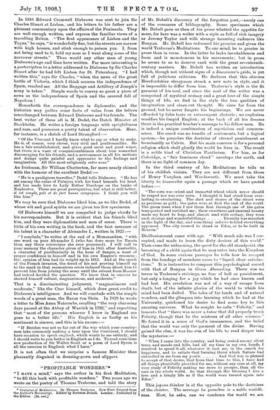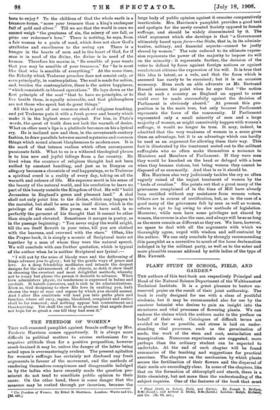"PROFITABLE WONDERS."* "I RAVE a mind," says the author in
his first Meditation, "to fill this book with profitable wonders." Two years ago we wrote on the poetry of Thomas Traherne, and told the story
• Centuries of Meditations. By Thomas Trahente. Now First Printed from the Author's Manuscript. Edited by Bertram Debut', London Published by the Editor. De. net.]
of Mr. Dobell's discovery of the forgotten poet,—surely one of the romances of bibliography. Some specimens which Mr. Dobell gave us then of his prose whetted the appetite for more, for here was a writer with a style as full of rich imagery as Jeremy Taylor and with strange haunting cadences like Bunyan. Mr. Dobell has redeemed his promise and given the world Traherne's Meditations. To our mind, he is greater in prose than in verse. In the latter lie lacks inevitableness and form and is monotonous in his movements; but in prose he seems to us to deserve rank with the great seventeenth- century masters. Mr. Dobell has written an introduction which, though not without signs of a discoverer's pride, is yet full of judicious criticism. He declares that this obscure Herefordshire clergyman struck a new note in style, and it is impossible to differ from him. Tr:theme's style is the fit garment of his soul, and since the soul of the writer was a compound of mystical ecstasy and a great love of the simple things of life, we find in the style the two qualities of imagination and clean-cut thought. He rises far from the ground, but he never forgets his beginnings. We are never offended by false taste or extravagant rhetoric ; no euphuism muddies his limpid English ; at the back of all his dreams
there is the practical teacher's message to his fellow-men. He is indeed a unique combination of mysticism and common- sense. His creed was no bundle of sentiments, but a logical system,—he preaches the doctrine of eternal punishment as trenchantly as Calvin. But his main concern is for a personal
religion which shall glorify the world he lives in. The result is a noble kind of Christian Pantheism. For him, as for Coleridge, a "fair luminous cloud" envelops the earth, and there is no light of common day.
In the third century of his Meditations he tells us of hie childish visions. They are not different from those of Henry Vaughan and Wordsworth. We must take the liberty to transcribe again a passage which we have quoted before :—
" The corn was orient and immortal wheat which never should be reaped nor was ever sown. I thought it had stood from ever- lasting to everlasting. The dust and stones of the street were as precious as gold ; the gates were at first the end of the world. The green trees when I saw them first through one of the gates transported and ravished me ; their sweetness and unusual beauty made my heart to leap, and almost mad with ecstasy, they were
such strange and wonderful things Eternity was manifest in the light of the day, and something infinite behind everything appeared. The city seemed to stand in Eden, or to be built in Heaven."
Disillusionment came with age. "With much ado was I cor- rupted, and made to learn the dirty devices of this world." Then came the unlearning, the quest for the old standpoint, the becoming of a child again that he may enter into the Kingdom of God. In some curious passages he tells how he escaped from the bondage of mundane cares to "liquid, clear satisfac- tions." It is instructive to compare this psychological record with that of Bunyan in Grace Abounding. There was no terror in Traherne's strivings, no fear of hell or punishment,
but only a longing for a joy which he had once known and had lost. His revelation was not of a way of escape from death, but of the infinite glories of the world to which his mind had been dulled. The tales of far lands and of natural wonders, and the glimpses into learning which he had at the University, quickened his desire to find some key to this amazing universe. What he sought he calls "Felicity," and laments that "there was never a tutor that did properly teach
Felicity, though that be the mistress of all other sciences." He found it in a sense of God's immanence, and the belief that the world was only the garment of the divine. Having gained the clue, it was the aim of his life to read deeper into the mysteries :— " When I came into the country, and being seated among silent trees, and meads and hills, had all my time in my own hands, I resolved to spend it all, whatever it cost me, in the search for happiness, and to satiate that burning thirst which Nature had
enkindled in me from my youth And God was so pleased to accept of that desire, that from that time to this, I have had all things plentifully provided for me, without any care at all, my very study of Felicity making me more to prosper, than all the care in the whole world. So that through His blessing I live a free and a kingly life as if the world were turned again into Eden."
This joyous thinker is at the opposite pole to the doctrines of the cloister. The message he preaches is a noble worldli- ness. How, be asks, can we condemn the world we are
born to enjoy ? To the children of God the whole earth is a treasure-house, "more your treasure than a king's exchequer full of gold and silver." Till we see that the world is ours we tutntot weigh "the greatness of sin, the misery of our fall, or prize our redeemer's love." There is nothing, he says, from a fair woman to a grain of sand, which does not show God's attributes and excellences to the seeing eye. There is a htniger in the hearts of men and in the heart of God, for if
Man is in need of the divine, the divine is in need of the heman. Therefore his maxim is, "Be sensible of your wants that you may be sensible of your treasures," for "he is most
like God who is sensible of everything." At the same time, the Felicity which Traherne preaches does not consist only, or even principally, in contemplation. The soul is made for action, and, besides the contemplative, there is the active happiness, " which consisteth in blessed operations." He lays down as the first principle of the soul "that to have no principles, or to Jive beside them, is equally miserable, and that philosophers 'are not those who speak but do great things."
All this is part of our common stock of religious teaching, and yet Traherne puts it with a fresh power and beauty which make it in the highest sense original. For him, in Plato's words, the quest of truth does not lack the warmth of desire.
What on other men's lips is a platitude becomes on his a lyrical Cry. He is inclined now and then, in the seventeenth-century fashion, to draw parallels between sacred mysteries and common things which sound almost blasphemous to modern ears. It is the niark of that intense realism which often accompanies "passionate faith. What to us is a withered theological phrase is to hint new and joyful tidings from a far country. He lived when the counters of, religious thought had not been sullied by constant handling, and just as in Bunyan an
allegory becomes a chronicle of real happenings, so to Traherne a spiritual creed is a reality of every day, taking on all the
warmth and colours of life. His supreme merit is his sense of the beauty of the natural world, and his resolution to leave no part of this beauty outside the Kingdom of God. He will "build Jerusalem in England's green and pleasant land." A clod shall not only point him to the divine, which may happen to the moralist, but shall be seen as in itself divine, which is the privilege of the saint. Hia prose, as we have said, is so
perfectly the garment of his thought that it cannot be other than simple and elevated. Sometimes it merges in poetry, as in the passage beginning : "You never enjoy the world aright,
till the sea itself floweth in your veins, till you are clothed with the heavens, and crowned with the stars." Often, like the Prayer-book, it is simply a mosaic of Scriptural texts set together by a man of whom they were the natural speech. We will conclude with one further quotation, which is typical of the author when he is neither Scriptural nor lyrical :—
" I will not by the noise of bloody wars and the dethroning of kings advance you to glory ; but by the gentle ways of peace and love. As a deep friendship meditates and intends the deepest designs for the advancement of its objects, so doth it shew itself
• in choosing the sweetest and most delightful methods, whereby not to weary but please the person it desireth to advance. When love administers physic, its tenderness is expressed in balms and cordials. It hateth corrosives, and is rich in its administrations. Even so, God designing to show His love in exalting you, bath chosen the ways of ease and repose by which you should ascend. And 1 after His similitude will lead you into paths plain and familiar, where all envy, rapine, bloodshed, complaint and malice shall be far removed; and nothing appear but contentment and thanksgiving. Yet shall the end be so glorious that angels durst not hope for so great a one till they had seen it."







































 Previous page
Previous page